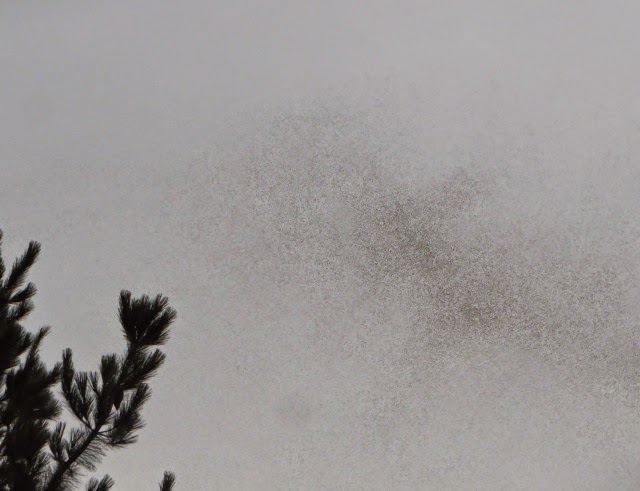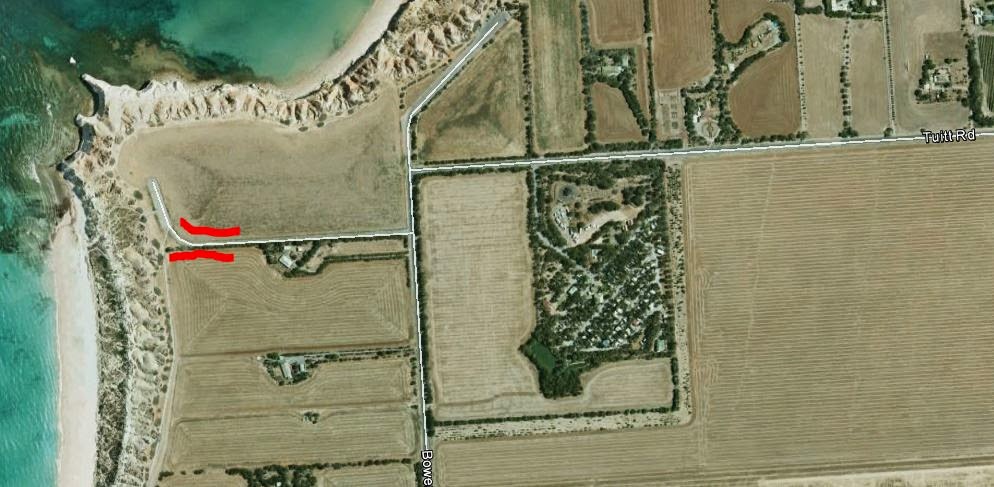Local Land Services to save the State?
I'll start off by noting that attempting to find an official on-line history of this saga is rather difficult. (If I was short of conspiracy theories - which condition will not exist while our current Commonwealth or State Government are in power - I'd say this is a plot to conceal the true objectives of establishing Local Land Services (LLS)). The main thrust of the post is to look at the election of Directors for Local Land Services, but a bit of background as I see it is necessary first.
In the past (at least since 1934) New South Wales was served by a network of organisations called Pastures Protection Boards. Their primary function was to protect pastures (mainly from weeds and feral animals). (A subsidiary function was the maintenance and management of Travelling Stock Reserves (TSRs) to provide rest areas for stock being droved along the roads.) There seems to have been a name change to Rural Lands Protection Boards (RLPB) in the 1980s but the function continued.
In the noughties - possibly 2009 - the RLPBs acquired functions relating to inspection of stock at markets (and were also merged to become more 'Regional'). The name also changed - keeping letterhead designers in employment - to Livestock Health and Pest Authority (LHPA). Other than reducing the staff - and of course consequently the level of service available to the ratepayers - this didn't seem to have much impact. I'll note here that I got a lot of advice from the SELHPA ranger for our area.
Then came the great innovation of electing the O'Farrell Government. They decided that it would be more efficient to merge the LHPAs with Catchment Management Authorities (which did an awful lot of good things for the waterways of the State) and part of the old NSW Department of Primary Industries. They would be administered as 11 Regions (most of which are bigger than many countries) defined as amalgams of Local Government areas.
We are part of the SE Region which covers land ranging from coastal plains, to escarpment rainforest to tableland plains to alpine peaks. Trying to look after the range of threats to Rural Lands and Catchments across that lot is a ridiculous task.
It is of course ridiculous to administer Catchments based on Local Government boundaries. Water pays no heed to such things being concerned only with flowing downhill. This is particularly nuts when the Continental Divide rnus right though the middle of the area.
But anyhow LLS have been created. For this Region the Board of LLS seems to be 7 people:
A first point is that Googling the names of the Chair and the 3 appointed members of the SE LLS Board has revealed nothing about them. They seem totally invisible to the World Wide Web. I find this quite astonishing, given the number of references to me on the web.The second point, and more what I want to comment on, is that these elected Directors will be elected by one landholder for each property. I have got the papers to vote in this election. To say the least the process of getting these was a shambles. Here follows part of an email I sent to a State politician:
I only recognised two names:
So really that left three people standing with their legs crossed waiting for one free cubicle. All three of them came from the Monaro so a desire for balance across the Region wasn't a decisive factor. All were blokes so improving the gender balance wasn't an issue (there were few sheilas in the field and most of them tended to use bad language (see above). All three of the survivors indicated they were interested in protecting the environment as well as serving farmers. In the end I was persuaded by the highlighted words below:
I will augment this post as maters develop.
In the past (at least since 1934) New South Wales was served by a network of organisations called Pastures Protection Boards. Their primary function was to protect pastures (mainly from weeds and feral animals). (A subsidiary function was the maintenance and management of Travelling Stock Reserves (TSRs) to provide rest areas for stock being droved along the roads.) There seems to have been a name change to Rural Lands Protection Boards (RLPB) in the 1980s but the function continued.
In the noughties - possibly 2009 - the RLPBs acquired functions relating to inspection of stock at markets (and were also merged to become more 'Regional'). The name also changed - keeping letterhead designers in employment - to Livestock Health and Pest Authority (LHPA). Other than reducing the staff - and of course consequently the level of service available to the ratepayers - this didn't seem to have much impact. I'll note here that I got a lot of advice from the SELHPA ranger for our area.
Then came the great innovation of electing the O'Farrell Government. They decided that it would be more efficient to merge the LHPAs with Catchment Management Authorities (which did an awful lot of good things for the waterways of the State) and part of the old NSW Department of Primary Industries. They would be administered as 11 Regions (most of which are bigger than many countries) defined as amalgams of Local Government areas.
We are part of the SE Region which covers land ranging from coastal plains, to escarpment rainforest to tableland plains to alpine peaks. Trying to look after the range of threats to Rural Lands and Catchments across that lot is a ridiculous task.
It is of course ridiculous to administer Catchments based on Local Government boundaries. Water pays no heed to such things being concerned only with flowing downhill. This is particularly nuts when the Continental Divide rnus right though the middle of the area.
But anyhow LLS have been created. For this Region the Board of LLS seems to be 7 people:
- the Chair (appointed by the Government);
- 3 members appointed by the Government; and
- 3 members elected by ratepayers.
A first point is that Googling the names of the Chair and the 3 appointed members of the SE LLS Board has revealed nothing about them. They seem totally invisible to the World Wide Web. I find this quite astonishing, given the number of references to me on the web.The second point, and more what I want to comment on, is that these elected Directors will be elected by one landholder for each property. I have got the papers to vote in this election. To say the least the process of getting these was a shambles. Here follows part of an email I sent to a State politician:
I have just received material from the LHPA including some forms which apparently will enable myself and my wife to become enrolled to vote in elections for the Board of the LLS. Undertaking such a role would seem to be a basic right and responsibility of landholders in the area. However the forms are so badlly worded and designed that it is almost impossible to work out what is required (and particularly why one has to be "nominated" to be put on the roll. (Why people have not been automatically transferred over from their LHPA function is beyond me.)This was followed by a second email:
... I have attempted to download an additional copy of the enrollment form to get on the Roll for voting in LLS matters. The link on the LLS website doesn't work! (That was confirmed by an officer of LLS Braidwood (phone number obtained from the LLS webpage) during a phone conversation to try to sort this out.)However, I got on the Roll of Electors. I subsequently heard some tales about one person's attempt to become a candidate in the election. Unfortunately they appeared not to own a big enough property to get on the Roll to start with. Then on 28 February I received details of the list of punters who had put themselves forward for election. There were 35 of them, from which I was to vote for 3. How to choose the ones I wanted?
I would point out that the LLS officer was totally professional and charming. She scores no blame for this fiasco.
During the conversation it emerged that the office - I think Catchment Management rather than LHPA:
- had no copies of the relevant form (in contrast to what was stated in the doco I received) ;
- had not been told that every landholder in the area was getting documentation about this election today; and
What an utter shambles. This from a Government of the same Party as that which is proposing to instill good management at the Commonwealth level.
- had not been told the address to which completed forms should be sent.
I only recognised two names:
- one had stood in our Council elections and I had worked hard, and successfully, to block his election then;
- another had stood as a Palmer United Party candidate in the recent Federal election
- 7 of them had not supplied a supporting statement to the authorities. Goodbye! 26 left.
- 5 made a big play about their involvement with the RFS. Sorry, an organisation that views the natural environment as no more than a source of fuel doesn't get my support. 21 left.
- 5 more used bad language such as "passionate", "extraordinary life experience", "journey". 16 left.
- 11 more bit the dust because their words didn't inspire me - for example, a dairy-products freak; an oyster farmer (seems not to get the word 'Land' too clearly, but they would be interested in the Catchment aspects); a person against against environmental management; a member of the former Tallaganda Council which burdened our area with massive debt; someone who set up the LLS system. 5 left 'live'.
So really that left three people standing with their legs crossed waiting for one free cubicle. All three of them came from the Monaro so a desire for balance across the Region wasn't a decisive factor. All were blokes so improving the gender balance wasn't an issue (there were few sheilas in the field and most of them tended to use bad language (see above). All three of the survivors indicated they were interested in protecting the environment as well as serving farmers. In the end I was persuaded by the highlighted words below:
"Managing the administration of LLS to minimise red tape in livestock marketing and management, management of pests and weed and maintenance of biodiversity and biosecurity systems is a critical part of this role."It is very surprising that there has been no media interest in these elections (even from local rags) and no communications from any of the candidates. Given the scope for personal development through serving on this Board I'd have expected the more interested people to dip their hands into their pockets for a mail-out or two. Perhaps it will happen next week?
I will augment this post as maters develop.





Comments